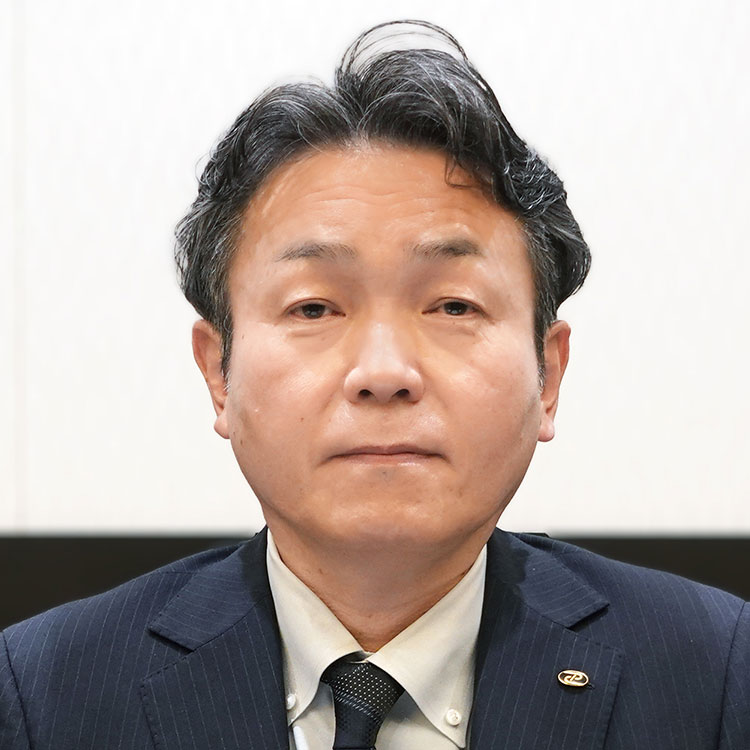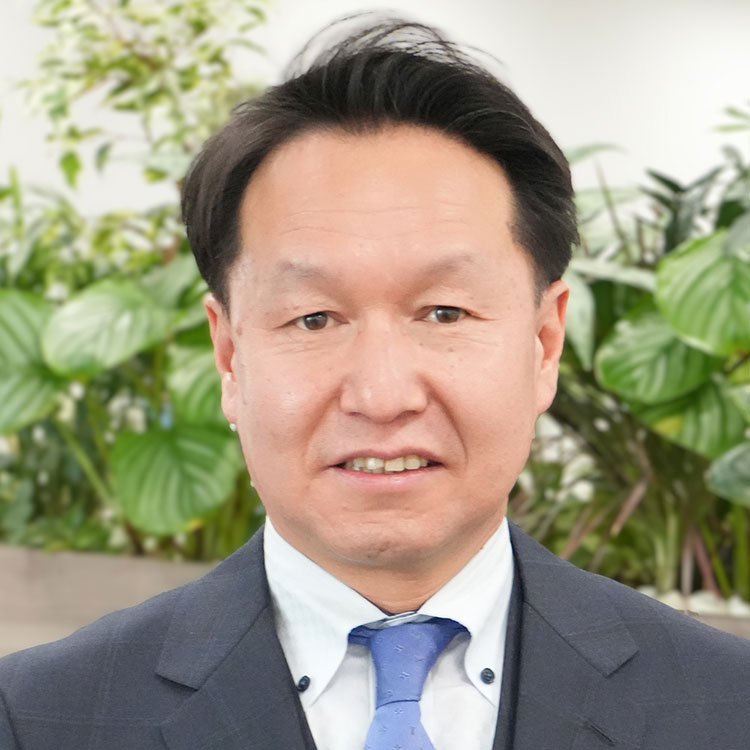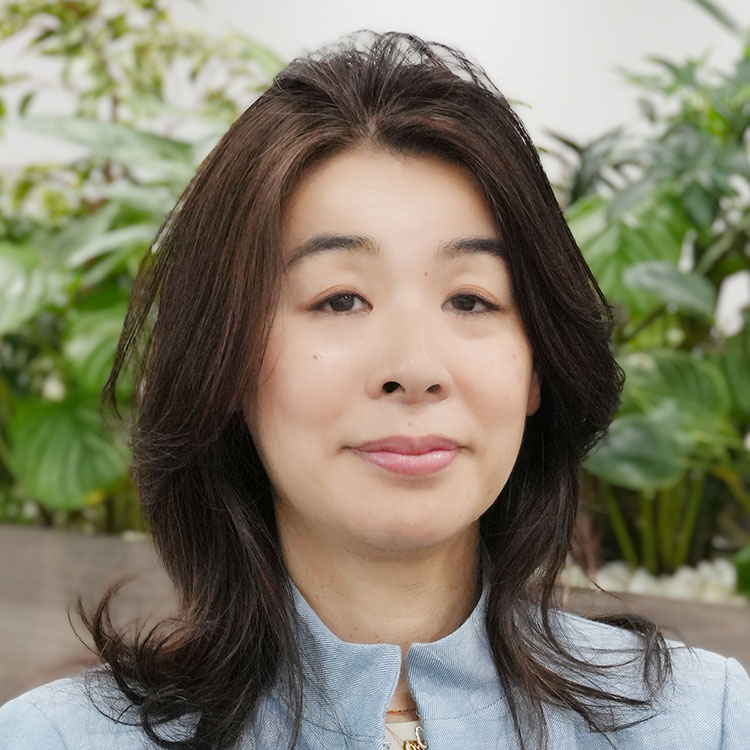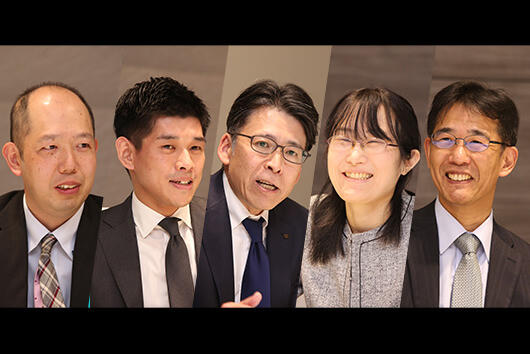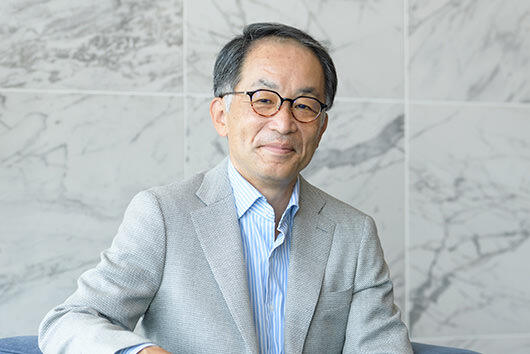PACIFIC CONSULTANTS GROUP has once again declared DE&I (Diversity, Equity & Inclusion) as a management guideline for 2023 and has been working on various initiatives. We asked three people: Shunji TAKANISHI, General Manager of General Affairs Dept. who is the supervisor of promoting DE&I; Kazuhiko OBOKATA, Director General of Land Infrastructure Div. who is in charge of promoting this initiative policy in his jurisdiction; and Momoko ABURAYA, General Manager of Section of the Career Development Sec., who is promoting the DE&I project in Human Resources Dept. about hat do they think about the results and challenges at the current stage, and what measures will they pursue in the future?
INDEX
- From D&I to DE&I
- What kind of company do we aim to be through DE&I?
- Four pillars and key measures
- Drastic Change in awareness promoted by business divisions
- How will DE&I change our work life in the company?
From D&I to DE&I
--Our company had been working on D&I up until now, but in 2023 we issued PACIFIC CONSULTANTS DE&I Declaration once again. Why was that?
TAKANISHI: PACIFIC CONSULTANTS is a professional group that has been providing all kinds of civil engineering services such as strategy and research, planning and design, construction management, and maintenance of various social infrastructures from the establishment for over 70 years. Civil engineering is a general term for technology that creates an environment where citizens can live peacefully and safely, and all employees at our company are professionals, regardless of their job type such as technical, sales, or administrative work. Our greatest capital is our "people". It is essential for the growth of PACIFIC CONSULTANTS GROUP that our diverse workforce, with its diversity in gender, age, nationality, and lifestyle, can work and thrive in their own ways. For this reason, we believe that the element of DE&I, especially E (Equity), is important for our group to advance global expansion, business transformation, innovation in order to ensure that unconscious bias does not impede fair opportunities and contributions. We believe that it is through diversity that we can demonstrate great strength in realizing our vision of "Producing the Future".
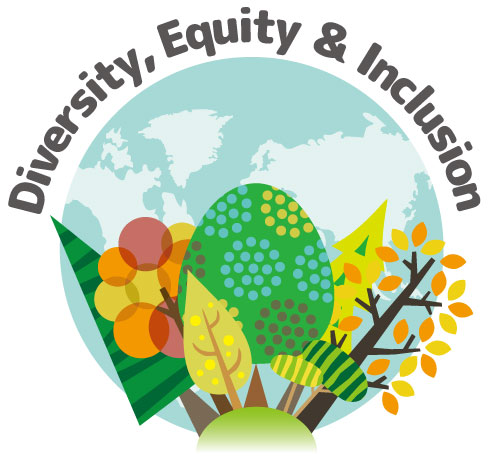
PACIFIC CONSULTANTS DE&I Declaration
PACIFIC CONSULTANTS has its roots in "Pacific Consultants. Inc.", which was established in 1951 by Japanese and American engineers to contribute to the reconstruction of Japan, and has developed by leveraging the diversity and comprehensive strength of its technical fields. In order to realize our group vision of "Producing the Future," it is important to respect the different knowledge, experience, values, and individuality of each employee, and to create new value by maximizing and integrating the power of individuals and teams.
Through the new value and innovation created by our diverse talent, we will contribute to the realization of our group vision and ultimately to the sustainable development of society as a whole.
--What does the data show about the progress of diversity promotion at our company?
TAKANISHI: First of all, about the status of women's participation in the workforce. To be honest, I recognize that our industry is quite left behind. Currently, the percentage of female employees among full-time employees at PACIFIC CONSULTANTSM is 21.2%. Ten years ago, it was 7.3%. Looking only at employees who joined the company as new graduates, it has been over 30% for the past 10 years, with an average of 34.8% over the past 10 years. Looking at management positions, the percentage of women is 8.3%, which is nearly three times the 3.1% from 10 years ago, but it is by no means a figure to be proud of. Our company has been promoting D&I since 2013. I believe that by the time employees who joined the company around that time become managers, the number should be about 20%, the same as the female employee ratio. In addition, the percentage of female employees in positions such as General Manager of Sectione and General Manager of Department is 5.9%, which is only a 2-point increase from 10 years ago. Over the past 10 years, the percentage of female employees joining the company as new graduates has steadily increased, but there are still few female employees in managerial positions, so increasing the proportion of women in managerial positions remains a challenge for the future.
Looking at other circumstances, the majority of our employees continue to work after retirement, so seniors are playing an active role, and the rate at which male employees take childcare leave is 81.1%, which is significantly higher than the national average of 30.1% in survey of the Ministry of Health, Labour and Welfare. The average number of days of paternity childcare leave is 69 days, which is significantly higher than the national average of 46.5 days in the survey of the Ministry of Health, Labour and Welfare. Furthermore, under the company-wide globalization management strategy, the number of foreign full-time employees is gradually increasing. Many mid-career employees are also actively working here, with about 30% of employees who joined the company in the previous fiscal year (FY73rd) of our company are mid-career employees, and about 30% of the company as a whole. We have an open culture where anyone can play an active role, regardless of whether they are a new graduate or a mid-career employee.
What kind of company do we aim to be through DE&I?
--What do you aim to achieve by promoting DE&I?
TAKANISHI: We will create a flexible system where everyone can play an active role and make solid investments in people's growth. And in order to achieve PACIFIC CONSULTANTS GROUP's mission of "realizing a society where people around the world can live in peace and security through infrastructure development" and "protecting the global environment and passing on a rich earth to the next generation," we will continue our activities on the field of the world. There are many precedents and evidence of the effects of DE&I in the world. For example, survey results show that companies that promote the participation of women in the workforce tend to have better management indicators and higher stock market valuations, and that companies that work on work-life balance tend to perform better. In order to further develop our company, I would like to instill DE&I in every corner of the company.
--Please tell us about any personal experiences you have had regarding the effectiveness of DE&I initiatives.
ABURAYA: I think that Corporate Group I work is already one of the most diverse organizations in the company. There are many female employees, and the age range of both men and women is wide. Some people came to Corporate Group from the Business Division, and many people joined the company for mid-career. When we think about what to do to advance measures, things like "This is how someone from the Business Division would feel" or "We did it like this at my previous company" come up naturally, leading to lively discussions, and I think this allows us to devise systems and operational mechanisms.
OBOKATA: I was the General Manager of of Water Supply & Sewage Dept. until last year. In the work of our Water Supply & Sewage Dept., we rarely have anything to do with the construction supervision phase, but I was taken aback by a comment made by an employee who had gained experience in construction supervision on-site and had transferred from a general contractor. It's something that you don't notice even when talking with a homogeneous team. Since then, I've become more conscious of listening to the opinions of as many different members as possible.
TAKANISHI: When I was in the technical department, I was the General Manager of Dept. with a high ratio of female employees. It was an organization where someone was always on maternity leave or childcare leave, and it was normal for A to be absent from a certain month to a certain month, and B to be absent during this period. If there are no people, sales will naturally fall. Therefore, we formulated and revised business plans based on that premise. It is normal now, but at that time, I think we tended to think about how to make up for those who were not there. As I mentioned earlier, the number of male employees taking childcare leave is increasing. We can operate the organization flexibly according to individual circumstances, not just in terms of women and men. I think this is what an organization should be like.
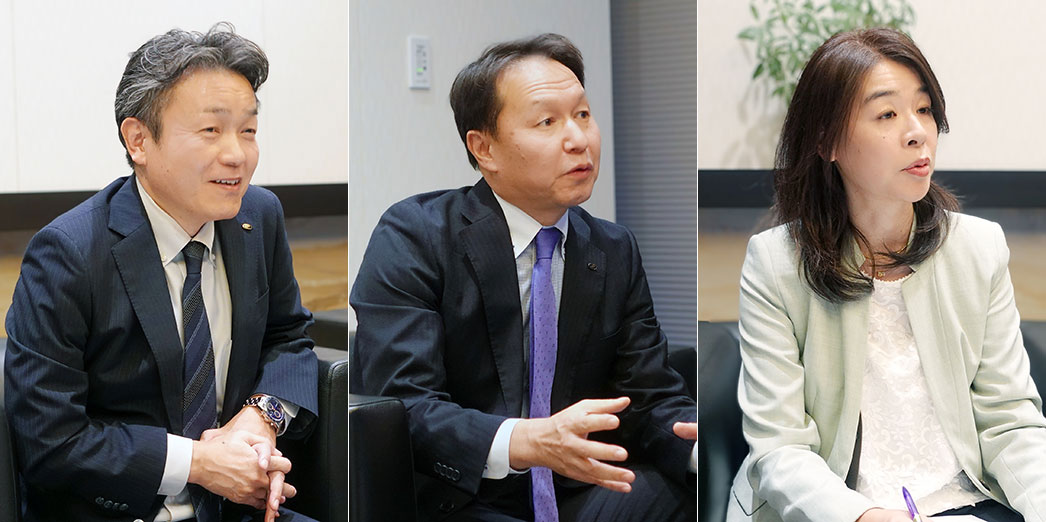
Four pillars and key measures
--I heard that you have put together a new set of key measures for this fiscal year. Could you please tell us about them?
ABURAYA: We have established four pillars and outlined key measures for each. The first pillar is "Understanding the essence of DE&I." First, the management team held a discussion to provide an opportunity to talk in their own words about what DE&I means and what state our company is aiming for. After that, the management team participated as observers in a discussion with Director General, General Manager of Regional Headquarters/Branch Office, General Manager of Corporate/Operation Dept. We are also planning a discussion for the General Manager of Dept. of each Business Division. of business headquarters in the future.
The second pillar is "promotion of equity." We will continue to provide fair opportunities to support the active participation of diverse human resources. Specific measures we will be taking this fiscal year include strengthening support for employees who are care-givers for family members and providing support for the working styles of not only women but also men after returning from childcare leave. The survey also revealed that female employees have only one-third the opportunities for active participation outside the company, such as through external transfers and outside activities, compared to men. We would like to understand this and at the same time take steps to correct any factors that hinder active participation.
The third is "creating a psychologically safe workplace." Even if a diverse workforce is gathered, diversity cannot be fully utilized due to the presence of a dominant leader. If the mindset of "there's no way my boss would make such a mistake," "I might get scolded if I point it out," or "I won't gain anything from saying this" spreads throughout the organization, even when the boss is clearly wrong, diversity cannot be utilized. Therefore, our company has been introducing 1on1 for some time now to promote the creation of a psychologically safe workplace. It is a system in which a boss and subordinates regularly talk one-on-one to build a relationship of trust and allow subordinates to feel comfortable expressing their opinions.
The fourth pillar is "Creating new value by integrating knowledge and experience." We will create mechanisms and communities for sharing and utilizing knowledge across the company. Promoting DE&I is not a goal, but a necessity for creating new value and growing as a company.
-What was the reason for putting together these key measures?
ABURAYA: I have some regrets about our past efforts. Traditionally, we have reported data such as the number of male and female new graduates, the ratio of female employees in managerial positions, the ratio of foreign employees, and the ratio of male and female business managers once a year. However, to move to the next step, it is necessary for organizational heads to have a common understanding of the issues and translate them into concrete actions. For that reason, I think it is necessary to set goals as a company, provide training in a planned manner, show specific training plans for what kind of experience each person will have in the future, and support them while monitoring their progress. The female employees we have been hiring since about 10 years ago, when we started D&I management, are gradually approaching managerial years, so we would like to focus on supporting their career development.
Drastic change in awareness promoted by business divisions
-- Mr. OBOKATA is actively involved in projects at Land Infrastructure Div. Please tell us more about them.
OBOKATA: From June to September in the previous fiscal year (FY73rd) of our company, we held discussions on the theme of DE&I. Land Infrastructure Div. is particularly aware that it is lagging behind other divisions in terms of "women's participation in the workforce." Therefore, we first considered changing the awareness of leadership and held a discussion on the theme of promoting women's participation in the workforce among the General Managers of Depts. In this fiscal year (FY74th), each General Manager of Dept. is taking the lead and expanding the discussion within his/her Dept.
TAKANISHI: It is significant that the business division independently set up an opportunity for discussion. There is a strong impression that DE&I is something that the company is promoting, and it is difficult to foster a sense of it being something that concerns us. I hope that this will become a model case in which the business division takes the initiative.
OBOKATA: At first, none of the participants seemed used to it, but after the second and third sessions, I realized that the participants' awareness began to change. I'm glad we did it. The next step is to see how they can actually change their behaviors.
--In the FY74th, the Land Infrastructure Div. appointed its first two female General Managers of Sections.
OBOKATA: This is a big step forward for the Land Infrastructure Div. It is embarrassing to say that until now, the Land Infrastructure Div. has not been able to have a woman play active roles as a General Manager of Section even if she was qualified for the General Manager of Section. At this time, the two female General Managers of Sections have small children. We carefully explained to them, through the General Manager of Dept., the company and Business Division' policies, and our desire for them to take up the roles. We hope that their performance as General Managers of Sections will be a ray of hope not only for the female employees of the Land Infrastructure Div., but for all employees who have hesitated to become a General Manager of Section. My role is to create an environment where everyone can demonstrate their abilities, regardless of their individual circumstances or various constraints.
How will DE&I change our work life in the company?
--How will our workplaces, work, and corporate life change as we implement these priority measures?
OBOKATA: We tend to focus on women's participation in the workforce, but what we really mean is to create a place where everyone can thrive, whether they have restrictions or not. Whether it's childcare, care-giving, or even getting sick yourself, I think we need to create a company where people can maximize their capabilities, no matter what restrictions they may be burdened with. First of all, we need to become an organization that accepts diverse people, and in the medium to long term, we need to create an organization where everyone can thrive, fully utilizing the abilities they have. If we do that, restrictions will no longer be restrictions.
ABURAYA: I hope that we can become a company where each person can thrive naturally. Everyone has something they want to do, some people have to raise children or care for the elderly while working, some people want to study, and some people want to pursue their hobbies. I think it is important that everyone can thrive despite the various thoughts of different people. To that end, it is essential that each person acknowledges each other. As a prerequisite, it is also necessary to be somewhat open and share your own situation. You may not know what you are expected to do, and you may be given unnecessary consideration. I would like to create a team and environment where people can say, "I can do this, but let's all do this together."
TAKANISHI: We still have a long way to go in our DE&I efforts, and achieving this will not be the end. There is still a lot of diversity to address through DE&I, such as nationality, disability, and LGBTQ. We are at the stage of promoting women's participation in the workforce first, and that is why we want to move forward with women's participation at all costs. I believe that creating a workplace where everyone can work comfortably, increasing engagement and creating an organization with high psychological safety will lead to the growth of the company.




